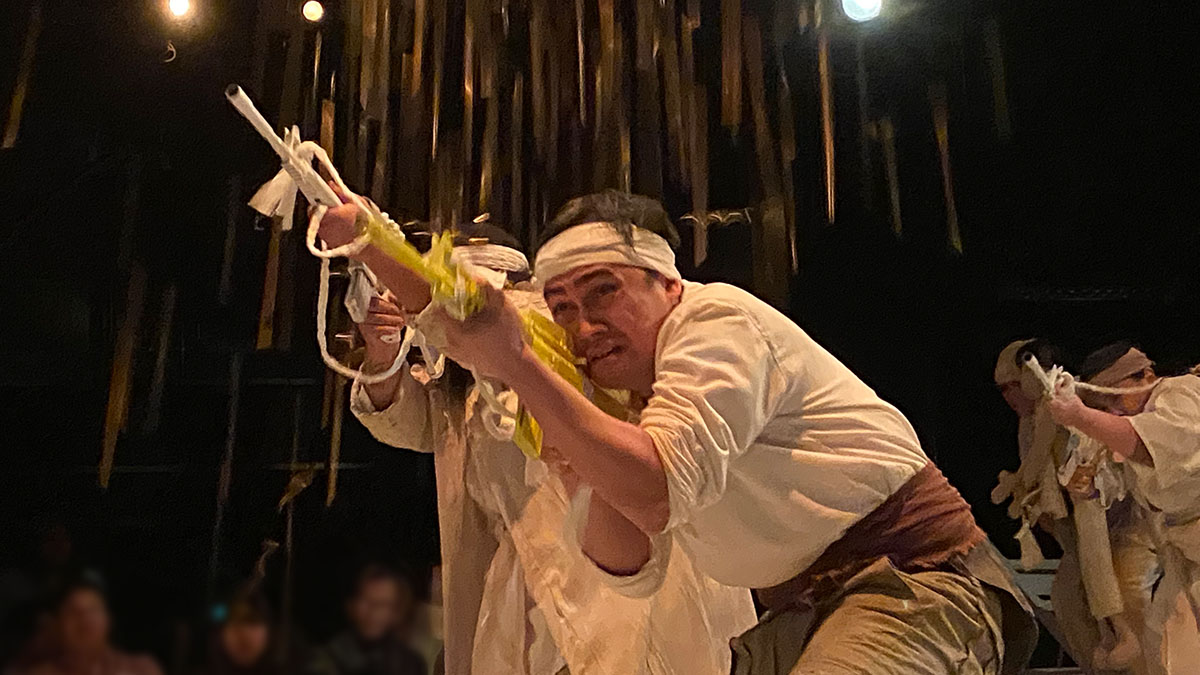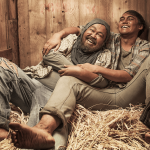Here’s our Review of Batang Mujahideen by playwright, Malou Jacob.
Armed conflict in Mindanao: One of the most complicated political questions our generation has faced, which has served as the crux of many a progressive play that set out to attempt to capture the scale of human suffering into a neat 2-3 hour show. Of course this is rarely, if at all achieved because of the multiple layers of complex ideologies and interests that can never be fully encapsulated in an evening of theatre, but it is the duty of a producer, playwright, director, actor, and crew of any theater company to its audience to try. Some focus on the movers and shakers, the “big guns” so to speak, in framing the conflict, and try to draw the eyes of the audience upwards to the higher macro, the bigger picture, where lofty philosophies and dogma reside. They populate the space with big characters with big voices that fill immense stages to approximate the massiveness of the idea of a generations-long war that can only be described as Shakespearean in magnitude.
Writer Malou Jacob’s Batang Mujahideen goes in a completely different direction. It tells the story of a child who witnesses the brutal death of her Muslim father at the hands of a Christian “Crusader” that causes her to veer from a path of peace and compassion to a path fraught with hate and vengeance. Her story is framed against the backdrop of a partly fictionalized event where Muslim insurgents attack a Claret school in Basilan and hold students, as well as some members of the school’s faculty and staff hostage, and in the exchange of hostilities between the Islamic and Christian factions, she finds herself caught in the middle. These circumstances entirely outside of her control set her on her way to the doorstep of her father’s killer – One can only imagine a small part of what kind of stress and duress causes the kind of trauma that drives children to forsake their identities, devote themselves so utterly to an unbelievably violent ideology, and train their young bodies in a manner not unlike those done by rebel soldiers in the vast, oppressive, cover of the Philippine wilderness.








Director Guelan Varela-Luarca masterfully realizes his vision, taking Malou Jacob’s stark and clear words, and with his talented production team, creates a surreal, and immersive show despite the pared down style. It’s the kind of deliberate, meditative theatre that sticks with you long after you leave the theater. The best example of this concept is manifested in the attention paid to the details of certain scenes that are used to ground the audience into the world of the play. That is one of the most important things to consider in creating shows that tackle big ideas and stories: the smaller scenes must be done well in order to suspend disbelief in the larger ones that can’t completely and literally translate reality in the limited space of the stage.
Batang Mujahideen is a beautiful and haunting tour de force that drags you kicking and screaming into a world you’d really rather not see.
The show opens with all the players washing their hands and face, using four copper basins that meander thoughtfully along the line-an expression of ritual cleansing before worship. It sets the tone for the rest of the show as the actors take turns as storytellers, and inhabiting multiple roles. This style of storytelling is further amplified by the reconstruction of the stage as a round instead of the usual proscenium style presentation, expected in the venue of the Aurelio Tolentino Theater of the CCP. It forces the audience to sit, not just closer to the stage but closer to each other, forcing the audience to shift from passive consumption to active involvement in the space with shifting perspectives from all four sides.
We are introduced to the conceit of the play, the titular role of Batang Mujahideen is played by actors manipulating soft form puppetry (the puppets used in this production are markedly simplified, and with good reason). Puppetry as a dramatic device has been around in more traditional forms such as Bunraku, Japanese Puppet Theatre, and in this production, it really is quite effective in a more profound way: The script originally called for the use of child actors, the director’s choice to instead employ the use of puppets in lieu of child actors adds a layer of meaning to the show. The point of the show is made explicit even more since in the heat and confusion of the long-drawn-out armed conflict in Mindanao, children who get tangled up in the fighting are never really there by choice. They are mere puppets whose strings are tied on by the people who exploit their youth and innocence to serve their own interests, and by the situation these children find themselves in, that’s completely beyond their control.






Around these child soldiers are stories that swirl in concentric circles, it is an insightful peek into what happened in the Abu Sayyaf camp up in the mountain, later on during a daring trek through the jungle when the rebels and hostages were being pursued by the Philippine Armed Forces, and the jarring culmination of their ordeal in an ill-fated firefight that will send you reeling in your seat. The members Tanghalang Pilipino Actors Company live up to the demands of the play and its staging. They inhabit all roles with equal enthusiasm and virtuosity, instantly making the audience buy into their character and the world they build using their stories. It makes for truly compelling theatre.
Batang Mujahideen is a beautiful and haunting tour de force that drags you kicking and screaming into a world you’d really rather not see. It is the antidote to our shared state of denial of what has been happening to our brothers and sisters down in war-torn Mindanao, as it perfectly illustrates the consequences of deep religious and political rifts that have been plaguing our country for decades. It does not offer up an explanation, but rather like most great theatrical pieces, it asks intelligent questions: it forces you to confront the realities of the immense humanitarian crisis, peel back the layers one at a time, and start looking for answers.
“Malou Jacob’s Batang Mujahideen” presented by Tanghalang Pilipino is currently running until March 8, 2020, at the Cultural Center of the Philippines’ Tanghalang Aurelio Tolentino, CCP Complex, Pasay City. Tickets are available through TicketWorld or through the CCP Box Office.
Click here for more stories like “REVIEW: Batang Mujahideen by Malou Jacob”. Make sure to follow and subscribe to our social media accounts: Facebook, YouTube, Instagram, and Twitter.





















